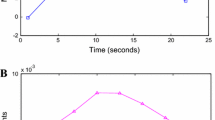Abstract
In functional linear regression, one conventional approach is to first perform functional principal component analysis (FPCA) on the functional predictor and then use the first few leading functional principal component (FPC) scores to predict the response variable. The leading FPCs estimated by the conventional FPCA stand for the major source of variation of the functional predictor, but these leading FPCs may not be mostly correlated with the response variable, so the prediction accuracy of the functional linear regression model may not be optimal. In this paper, we propose a supervised version of FPCA by considering the correlation of the functional predictor and response variable. It can automatically estimate leading FPCs, which represent the major source of variation of the functional predictor and are simultaneously correlated with the response variable. Our supervised FPCA method is demonstrated to have a better prediction accuracy than the conventional FPCA method by using one real application on electroencephalography (EEG) data and three carefully designed simulation studies.






Similar content being viewed by others
References
Bair, E., Hastie, T., Paul, D., Tibshirani, R.: Prediction by supervised principal components. J. Am. Stat. Assoc. 101(473), 119–137 (2006)
Cardot, H., Faivre, R., Goulard, M.: Functional approaches for predicting land use with the temporal evolution of coarse resolution remote sensing data. J. Appl. Stat. 30(10), 1185–1199 (2003)
Fukunaga, K., Koontz, W.L.: Representation of random processes using the finite Karhunen–Loeve expansion. Inf. Control 16(1), 85–101 (1970)
Huang, J.Z., Shen, H., Buja, A.: The analysis of two-way functional data using two-way regularized singular value decompositions. J. Am. Stat. Assoc. 104(488), 1609–1620 (2009)
Li, G., Shen, H., Huang, J.Z.: Supervised sparse and functional principal component analysis. J. Comput. Graph. Stat. 25(3), 859–878 (2016)
Li, G., Yang, D., Nobel, A.B., Shen, H.: Supervised singular value decomposition and its asymptotic properties. J. Multivar. Anal. 146, 7–17 (2015)
Müller, H.-G., Stadtmüller, U.: Generalized functional linear models. Ann. Stat. 33, 774–805 (2005)
Ramsay, J., Hooker, G., Graves, S.: Functional Data Analysis with R and MATLAB. Use R!. Springer, New York (2009)
Ramsay, J.O., Silverman, B.W.: Applied Functional Data Analysis: Methods and Case Studies, vol. 77. Springer, New York (2002)
Ramsay, J.O., Silverman, B.W.: Functional Data Analysis, 2nd edn. Springer, New York (2005)
Ratcliffe, S.J., Heller, G.Z., Leader, L.R.: Functional data analysis with application to periodically stimulated foetal heart rate data. ii: Functional logistic regression. Stat. Med. 21(8), 1115–1127 (2002)
Silverman, B.W., et al.: Smoothed functional principal components analysis by choice of norm. Ann. Stat. 24(1), 1–24 (1996)
Yao, F., Müller, H.-G., Wang, J.-L.: Functional data analysis for sparse longitudinal data. J. Am. Stat. Assoc. 100(470), 577–590 (2005)
Zhang, X.L., Begleiter, H., Porjesz, B., Wang, W., Litke, A.: Event related potentials during object recognition tasks. Brain Res. Bull. 38(6), 531–538 (1995)
Acknowledgements
The authors would like to thank the Editor, the Associated Editor, and two reviewers for their very constructive suggestions and comments on the manuscript. They are extremely helpful for us to improve our work. The authors are also very grateful to Prof. Gen Li and Prof. Xiaoyan Leng for kindly providing us with their data and their computing codes. This research was supported by Nie’s Postgraduate Scholarship-Doctorial (PGS-D) from the Natural Sciences and Engineering Research Council of Canada (NSERC), and the NSERC Discovery grants of Wang and Cao.
Author information
Authors and Affiliations
Corresponding author
Electronic supplementary material
Below is the link to the electronic supplementary material.
11222_2017_9758_MOESM2_ESM.pdf
Supplementary Document: This file contains some additional figures for simulation studies in Section 5, two additional simulation studies with an arbitrary coefficient function and a large number of FPCs related to the outcome, respectively. We also include another real data application analyzing the time course yeast gene expression data. (supplementary.pdf, PDF file), ESM 1 (R 3KB), ESM 2 (PDF 377KB)
Rights and permissions
About this article
Cite this article
Nie, Y., Wang, L., Liu, B. et al. Supervised functional principal component analysis. Stat Comput 28, 713–723 (2018). https://doi.org/10.1007/s11222-017-9758-2
Received:
Accepted:
Published:
Issue Date:
DOI: https://doi.org/10.1007/s11222-017-9758-2




